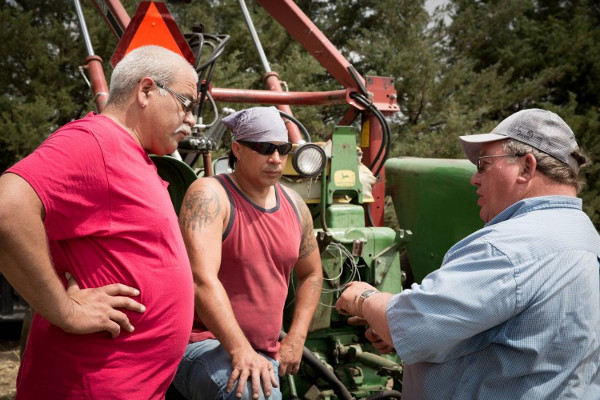
Photo/BOLDNEBRASKA.ORG
Editor’s note: Art Tanderup is a retired school teacher and farmer, and member of the Cowboy Indian Alliance opposing the Keystone XL II pipeline carrying dirty tar sands oil which will cut across Nebraska. Art discusses with the People’s Tribune how the pipeline will jeopardize the largest fresh water aquifer in existence.
Our number one focus is the water. I live in northeast Nebraska. Once that pipeline enters Nebraska it gets into the sandhills. The sandhills have a fragile environment, poor soil. All of us have to be stewards of the land. If we don’t, sand will drift like snow. People like me that farm in this area have adopted conservation practices. I use no-till farming which involves not tearing that soil up so it is open to erosion and drainage.
All that sits on top of the Ogallala Aquifer, the largest fresh water aquifer in existence. It starts in South Dakota, covers most of Nebraska, a good part of Kansas, parts of Wyoming, Colorado, New Mexico and Texas. It’s huge. The people of this area depend on that aquifer for our water. We obviously drink it, irrigate our crops with it, the livestock drink it, small towns and rural areas have wells and drink that water.
If the pipeline is built, once there is a leak, and it can be a leak that can’t be detected, those chemicals will be forced down into our aquifer and could be undetected for awhile. Once those chemicals are in the aquifer, there is no way the water can be cleaned.
When this thing was first proposed, TransCanada came in and told everyone that this is an oil pipeline. A lot of my neighbors believed that if there’s a leak, all they have to do is dig down, skim oil off the top and we’ll be fine. Wrong. It doesn’t take much Benzene to start killing animals and everything else, and that’s not the only chemical. If it gets in there—the aquifer is not 100% stationary but continues to move underground— chemicals will be distributed as time goes on. So we’re looking at a very dangerous situation that TransCanada can’t seem to understand and a lot of our politicians don’t understand.
Water is our most valuable resource. Right now if you buy individual bottles of water to drink, that water costs more than a gallon of gasoline. As time goes on, as clean water becomes more and more scarce, that difference will continue. What happens down the road as more and more water becomes contaminated? The clean water that remains will be sought after by the huge corporations (they will have a fifty-foot easement on everyone’s property along the pipeline), and they will control the water, the availability and price of water. Many of us on this Keystone route through Nebraska believe one of the reasons they want the route over the Aquifer is so that when the tarsands go by the wayside, they will have another source of revenue.
Next month Art discusses the pipeline fighters from every political spectrum who have joined this fight, as well as jobs, poverty and the importance of renewals.
Nebraskans fight to stop pipeline and protect the water
Latest
Free to republish but please credit the People's Tribune. Visit us at www.peoplestribune.org, email peoplestribune@gmail.com
The People’s Tribune brings you articles written by individuals or organizations, along with our own reporting. Bylined articles reflect the views of the authors. Unsigned articles reflect the views of the editorial board. Please credit the source when sharing: ©2024 peoplestribune.org. Please donate to help us keep bringing you voices of the movement. Click here. We’re all volunteer, no paid staff.


Many many thanks to the pipeline resistors; our children’s health and future depend on clean drinkable water, and keeping hidden pipelines out of the ground is key! It is obvious that greed rules the minds & hearts of the oil companies.
The aquifers must be protected!
I was dead set against the pipeline from the outset!!!